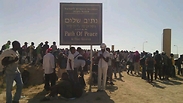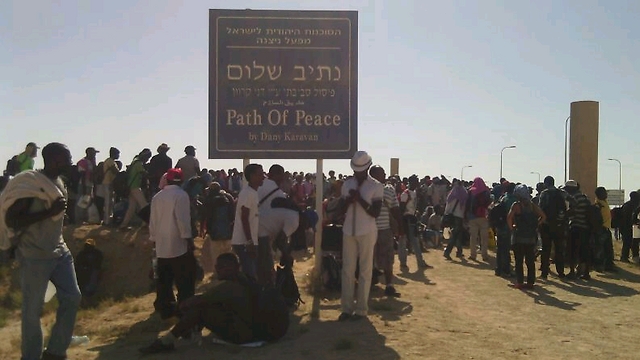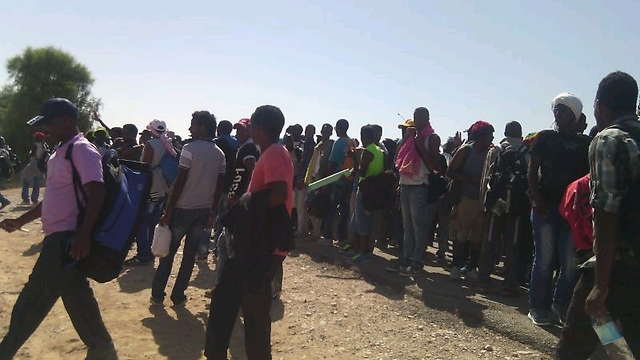
Seeking asylum
Photo: Liat Bultzman
Hundreds of Africa asylum seekers left the Holot "open prison" detention facility and headed for the Egypt-Israeli border Friday afternoon in a protest march against the government. Their main demands included being released from the facility and to be recognized as refugees.
Residents of the nearby Nitzana community joined the protestors and provided them with water beneath the intense desert sun. According to the IDF, the asylum seekers entered a closed military zone near the border and soldiers took action together with the police to remove protestors from the area.
Additional protests were held in Tel Aviv along the beaches and in front of both the US and German embassies.
Related stories:
- For refugee parents of stabbed baby, the nightmare still continues
- Asylum seekers' battle continues; refugees announce protest
- Police force asylum seekers into buses back to detention
Habtom, an asylum seeker from Eritrea, told Ynet, "They are trying to keep us from marching and protesting, but we won't give up. Many of us have been in Israel more than five years and the government hasn't reviewed our requests for asylum."
A statement from the Asylum Seekers' Committee in Holot appeared on Facebook also on Friday listing demands and announcing that daily protests in Holot would begin starting from June 19 and that prisoners had decided to stop signing in with authorities at the facility three times a day as they are currently required to do.
The Israeli government has come under fire on several occasions for their policy on African asylum seekers namely from Eritrea and Sudan. Human rights organizations have blamed the government for sweeping the issue under the rug and purposefully ignoring requests to receive refugee status.
"If Holot is an open facility, then why and until when (should) we stay here?" said the statement on Facebook. "And if it is a prison, then what is our crime?
"The international standards state that everyone has the right to the highest attainable standard of physical and mental health, but in Holot there is not even a basic (level) of medical treatment.
"To our brothers and sisters all over the country, we know that you are subject to arbitrary arrest, detention and exile as we are. Therefore we have made a commitment to keep on struggling for our basic rights and we will never give up, the justice and equality will last forever."
The committee also directly addressed the Israeli public in their statement. "To Israeli citizens we know that many of you do not agree with the harsh policies of the government, knowing that you are a people who know what it is like to suffer persecution.
"We are not your enemies. We entered Israel illegally because we had fled danger and needed a place of safety. We have no intention to harm Israelis, and we have no desire to destroy your home."
The Holot facility currently holds some 2,400 people. In the last two weeks protests have been growing within the facility, demanding improved health care and educational facilities.
The issue of African asylum seekers has been a growingly contentious issue in Israel over the last few years. Protests against the presence of the refugees in Israel have been common in southern Tel Aviv, suggesting that many Israelis may contest the comments in the statement from the committee.
Some Israelis have suggested that the Africans in Israel are not in fact refugees, but instead illegal migrants looking for work to send money back to their families in Africa. During protests in 2012, 17 Israelis were arrested for rioting and assault while others looted stores owned by Africans. MK Miri Regev attended the protests where she referred to the "infiltrators" as a "cancer in our society."
Several options have been discussed to attempting to solve the issues that arise through the presence of a large community of asylum seekers in a country as small as Israel.
MK Danny Danon suggested in the 2012 protests that Africans should be forcefully expelled back to the countries where they came from. "I spoke with the president of Sudan, and he said to me, 'no problem, send them back to us.'"
However, this approach raises humanitarian issues, since Sudan, particularly South Sudan, is considered to be one of the most difficult and dangerous of the world's third-world countries where many of the asylum seekers could face death upon their return.
Small numbers of Africans in Israel have been paid various sums of money and sent back to Africa, but mainly the government has taken the policy of sending asylum seekers to the Holot facility.
John-Michael Kibrick and Ilana Curiel contributed to this report.

















